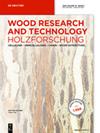南黄松的机械、物理和组成效应
IF 1.6
3区 农林科学
Q2 FORESTRY
引用次数: 0
摘要
随着气候变化导致木结构中真菌降解的风险越来越大,研究真菌降解机制与未经处理的木材构件强度之间的机制关系变得越来越重要。虽然已经进行了大量的工作来表征木材的腐烂,但还没有研究解决了刺木对未经处理的南黄松的影响。本研究旨在通过评估常见的褐腐真菌对美国东南部一种普遍存在的建筑材料——南黄松的影响来解决这一知识差距。在12周的时间里,对南黄松在7个腐烂阶段的特性进行了评价。在每个阶段测量物理性质的变化——质量、密度和水分含量。通过超声脉冲速度测试表征了刚度的变化,并利用热重分析来评估成分的变化。研究发现,早在4周的腐烂阶段,刚度就会迅速而显著地下降。在整个腐烂过程中,半纤维素和纤维素的降解是稳定的。这些结果可以用来开发一个更强的理解的机械行为的木结构结构在美国退化褐腐。本文章由计算机程序翻译,如有差异,请以英文原文为准。
Mechanical, physical and compositional effects of Meruliporia incrassata on Southern Yellow Pine
Abstract With the growing risk of fungal degradation in timber-framed structures from significant moisture intrusion events due to climate change, it is increasingly critical to develop mechanistic relationships between fungal degradation mechanisms and the strength of untreated wood components. While extensive work has been performed characterizing wood decay, no study has yet addressed the effects of Meruliporia incrassata on untreated Southern Yellow Pine. This seeks to address this knowledge gap by evaluating the effects of the common brown rot fungus on an ubiquitous building material in the southeast United States – Southern Yellow Pine. Properties of Southern Yellow Pine were evaluated at seven decay stages over the course of 12 weeks of exposure to M. incrassata . Changes in physical properties – mass, density, and moisture content – were measured at each stage. Changes in stiffness were characterized via ultrasonic pulse velocity testing, and thermogravimetric analysis was utilized to assess compositional changes. The study found rapid and significant losses in stiffness at decay stages as early as four-weeks. Hemicellulose and cellulose degradation occurred steadily throughout the decay period. These results can be utilized to develop a stronger understanding of the mechanical behavior of timber-framed structures in the United States degraded by brown rot.
求助全文
通过发布文献求助,成功后即可免费获取论文全文。
去求助
来源期刊

Holzforschung
工程技术-材料科学:纸与木材
CiteScore
4.60
自引率
4.20%
发文量
83
审稿时长
3.3 months
期刊介绍:
Holzforschung is an international scholarly journal that publishes cutting-edge research on the biology, chemistry, physics and technology of wood and wood components. High quality papers about biotechnology and tree genetics are also welcome. Rated year after year as one of the top scientific journals in the category of Pulp and Paper (ISI Journal Citation Index), Holzforschung represents innovative, high quality basic and applied research. The German title reflects the journal''s origins in a long scientific tradition, but all articles are published in English to stimulate and promote cooperation between experts all over the world. Ahead-of-print publishing ensures fastest possible knowledge transfer.
 求助内容:
求助内容: 应助结果提醒方式:
应助结果提醒方式:


